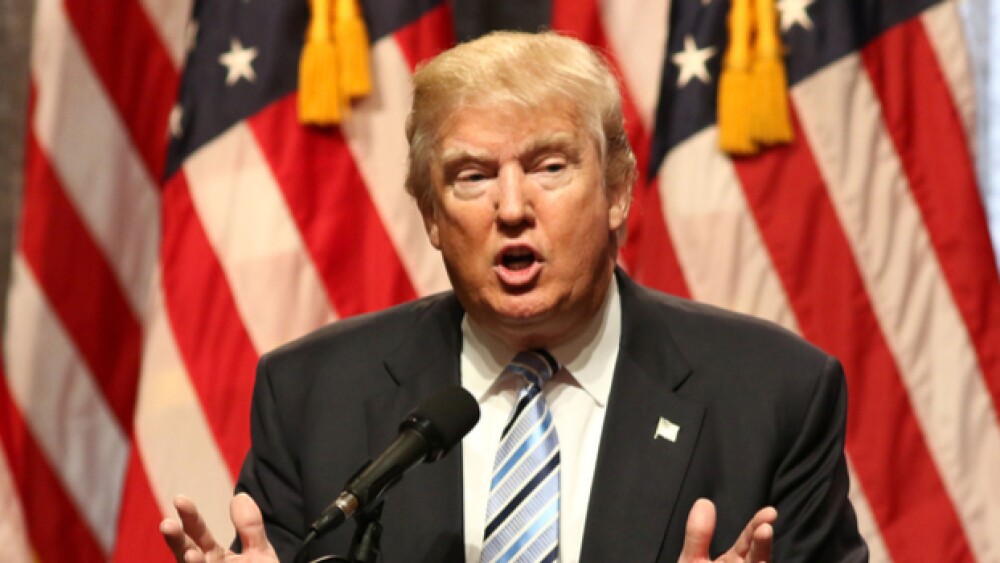According to a report, three people briefed on the plan indicated Trump wants to give AstraZeneca and the University of Oxford’s experimental COVID-19 vaccine emergency use authorization ahead of the U.S. presidential election on November 3.
JStone/Shutterstock
AstraZeneca stock jumped more than 3% this morning after rumors broke that President Trump was considering fast-tracking the company’s COVID-19 vaccine candidate. According to a Financial Times report, three people briefed on the plan indicated Trump wants to give AstraZeneca and the University of Oxford’s experimental COVID-19 vaccine emergency use authorization (EUA) ahead of the U.S. presidential election on November 3.
AstraZeneca, however, told the Financial Times that they had not discussed an EUA with the U.S. government. A spokesperson for Health and Human Services (HHS), which includes the U.S. Food and Drug Administration (FDA), told Financial Times that any rumor of an EUA for a vaccine before the election is “absolutely false.”
The denial brings a certain amount of warranted skepticism. Yesterday, the FDA gave convalescent plasma an EUA to treat COVID-19, timed on the eve of the Republican National Convention and announced in a Trump press conference. Preliminary results of a Mayo Clinic study of 35,000 patients treated with convalescent antibodies were only released on August 14 and had not been peer-reviewed. Although promising, there were problems with the study, such as a total lack of controls, which made the data difficult to interpret. And on Wednesday of last week, The New York Times reported that Anthony Fauci, director of the National Institute of Allergy and Infectious Diseases (NIAID) and Francis Collins, the direct of the National Institutes of Health (NIH), who have no authority over FDA, nonetheless tried to discourage the FDA from issuing an EUA for convalescent plasma, citing worries over the weak data.
The issue has become dramatically politicized. In a statement to Reuters, Peter Marks, director of the FDA’s Center for Biologics Evaluation and Research, who will be the person responsible for approving a potential COVID-19 vaccine, stated last week that he “would feel obligated” to resign from his role if the FDA approved a questionable vaccine. “In doing so,” he said, “I would indicate to the American public that there’s something wrong.”
On his part, Trump has both urged health officials to move faster and accused the FDA of a conspiracy against him. In a recent Tweet, Trump stated, “The deep state, or whoever, over at the FDA is making it very difficult for drug companies to get people in order to test the vaccines and therapeutics. Obviously, they are hoping to delay the answer until after November 3rd. Must focus on speed, and savings lives!” He tagged FDA Commissioner Stephen Hahn in the tweet.
He also complained about the FDA’s withdrawal of its EUA for hydroxychloroquine, which the president still recommends, but which numerous studies have shown to be largely ineffective in treating COVID-19 and sometimes is detrimental.
Further complicating the issue, at least from the perspective of a race to get a vaccine against COVID-19 available, is that Russia essentially bypassed Phase III trials of a COVID-19 vaccine, dubbed Sputnik V, and approved it for use. Then the country announced they were running the trials afterwards.
It was reported today that China began inoculating high-risk groups in late July, three weeks earlier than Russia, and the vaccine had not gone through late-stage trials either.
The AstraZeneca-Oxford vaccine reported a “strong immune response” in Phase a I/II trial in July and is currently in a Phase II/III trial in 30,000 people in the U.S., as well as a pediatric trial and studies in low-to-middle income countries like Brazil and South Africa. But AstraZeneca has reported it did not expect efficacy data until later this year.
The U.S. government inked a manufacturing agreement with AstraZeneca in May to deliver 300 million doses to Americans beginning in October. The U.S. Biomedical Advanced Research and Development Authority (BARDA) agreed to more than $1 billion in funding as part of the pact.
A spokesperson for AstraZeneca stated, “AstraZeneca has not discussed emergency use authorization with the U.S. government, and it would be premature to speculate on that possibility.”
House Speaker Nancy Pelosi responded on Twitter, urging the FDA to resist political pressure to fast-track an EUA ahead of the data, adding that Trump’s “dangerous attempt to inject himself into the scientific decisions of (the FDA) jeopardizes the health and well-being of all Americans.”





